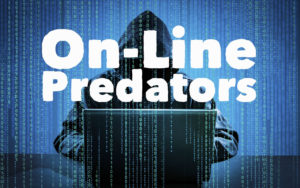Speaking not long ago at a US District Court, one of the participants shared with me that more and more crimes are committed against children from on-line predators and the rate dramatically rising. After all, it’s far easier to lure an unsuspecting child into a trap than it is to catch an adult who might be more alert to scams. Whether it’s a financial predator or a sexual predator, the  FBI acknowledges that by using popular apps such as Kik, Snapchat, ooVoo and Instagram (just to name a few), “tweens” and teens are being targeted at an alarming rate. Here we’ll discuss 7 ways to protect your kids from on-line predators.
FBI acknowledges that by using popular apps such as Kik, Snapchat, ooVoo and Instagram (just to name a few), “tweens” and teens are being targeted at an alarming rate. Here we’ll discuss 7 ways to protect your kids from on-line predators.
Here’s a Question Parents!
When you saw the short list of apps above are you familiar with them, why they are popular and what you need to do to protect your children (or in my case) grandchildren? I am fairly familiar with Snapchat and Instagram, but ooVoo and Kik are foreign to me (or at least were foreign). Trust me, on-line predators are intimately familiar with these and more. The challenge is staying one step ahead or at least in line with current technology so that you can be aware and communicate with you children effectively.
How do kids get hooked?
The simple answer to the question is they listen, pay attention and connect. Hate to ask this, but wonder how many of us as parents find ourselves so busy that we fail to fully be connected in our kids lives?
The on-line predator will sympathize and listen to every little problem you child shares. The effectively “groom” your child by being the one who is there. The predators job is simple, gain the trust of the target and seduce them by showing them with attention, kindness, understanding, and perhaps even gifts.
Where do they find my kids?
Social networking sites, blogs, instant messaging sites, email, chat rooms and discussion forums are the likely hangouts for predators. Say your kid has an interest in World of Warcraft (popular – extremely popular video game) and they find a discussion forum or chat room where “supposedly” like minded people hang out – that’s the feeding ground for predators. Since you can’t see in a virtual world who you’re talking to or if the person you’re communicating with is who they claim to be, kids find that their trusting nature is taken advantage of.
What Can I Do to Protect My Child?
Below are my suggestions for 7 ways to protect your kids from on-line predators. But let me caution you…some of these you may not like. Sorry…but I’d rather be a bit pushy here than timid.
- Kids by nature think that their parents are dumb. That is part of adolescence. Prove them wrong. Get your head out of the sand, learn what you need to learn and Talk To Your Kids. Help them see the potential dangers that are on-line (google it with them – cause the internet is always right – yea right), but you get the idea. If you can explain to the about the grooming process and help them understand the tactics used by on-line predators, you have a chance at getting their attention and raising their awareness. Kids are smart, so show them you care and you are as well.
- Be one, two or more steps ahead of your children. How you ask? By installing “spyware” on your devices so you know what is happening, as it’s happening to prevent unsuspecting kids from being the victims of on-line predators. For cell phones I’d recommend webwatcher found at webwatcher.com. Another outstanding option is puresight for computers, phones and tablets. Candidly you have two choices – let your children be the tech experts in the house (head in the sand approach) or you take charge. It’s not that you distrust your kids, it’s that you distrust everyone else and the only way to know what is happening is to monitor it. Your kids safety is more important than their privacy.
- While a computer in an open space easily visible by folks in the house might be great, it isn’t practical. Too many devices these days are too easy to view privately. So…(kinda back to #2) pay attention to what devices they have, routinely check them (like when they are asleep), and be observant if your child’s need for “privacy” is pushing your boundaries. Get to know where your kids visit and with whom they talk. Chat rooms that talk about music, sports, fashion, video games, etc. are the prime targets of on-line predators. Know where your kids go and be conversant with what’s happening in their lives.
- This is easier said than done. Since most social networking sites have an age limit, make sure that you abide by that and enforce that age limit (typically 13 and over) with your children. Now having said that, the truth is your kids by age 8 or 9 will likely know how to lie about their age and enroll in a site. Hence the need to have your devices protected so you’ll be aware if you kid is pulling a fast one. Remember, if they lie it’s not to be mean or malicious, they are just kids who like a cat want to get into place where they don’t belong.
- Choose a gender-neutral screen name. If an on-line predator can target your child, then beat them at their own game. Help your child understand that their screen name should not reveal anything about themselves including age, sex, zip code, area code, or school name. For example: if my screen name was “paper bag” there would be nothing that would give away anything about me. On the other hand, if my screen name was “chuckgallagher” that would provide lots of information from which someone could capture my identity.
- Have a straight forward talk with you kids about photos, snapchat (one of many) and the law. Here’s an example for girls. Never – I mean never take a photo of yourself naked or semi-naked to prove to someone that you love them or that you’re cool, or whatever the motive. If you believe that the young love of your life will never use that against you…you are dead wrong. And by dead I mean literally. Ask how many teens have committed suicide because the photo went viral when their boyfriend or jealous other girl posted it in social media. Just don’t do it. And for the guys…have the talk. Posting pics of yourself or others when they are underage makes you a sexual predator and that is a mark that will haunt you the rest of your life. It is never worth the cost. Sexting is a conversation you need to have and have it now!
- Never agree to meet someone in person that you’ve met on-line. OK…maybe as an adult you’ve done that, but you have the maturity to know when a meeting is safe and when it is not. Kids (respectfully said) don’t have that level of maturity. Don’t meet people. In fact, I’d take it a step or two further. As a parent, make sure that your kids cell phone is fully trackable. And if your child is driving install a GPS tracking device on their car. Again it is not that you distrust your child, but rather you distrust others who may not have your child’s best interest in mind.
What Happens if my Child is the Target of an on-line predator?
If you suspect your child is a target, gather all the information you have regarding the communication, the predator and their activity and report it immediately to law enforcement. Also there is a cybertipline to report child sexual exploitation.
By being aware and vigilant you can take a proactive stance out of love to protect you children. While the suggestions above are not all encompassing, they’ll go a long way to help you keep your child safe.
YOUR COMMENTS ARE WELCOME!


